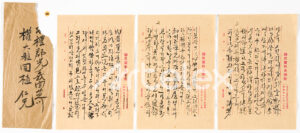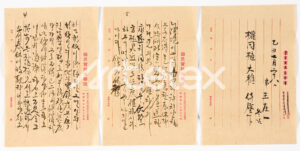Wang Jae-il was born on January 19, 1904, in Jicheon-ri, Gwang-ui-myeon, Gurye-gun, Jeollanam-do, Korea. While attending Gwangju High School in September 1926, he felt a deep need for independence due to the ethnic discrimination under Japanese colonial rule and decided to organize a secret anti-Japanese society with his schoolmates Jang Jae-sung and Park In-saeng from Gwangju Agricultural School.
On November 3, 1926, at Choi Kyu-chang’s house in Gwangju, Wang Jae-il and his comrades established a secret student society called Seongjin-hui (Awakening Society), with the aims of national independence, research in social sciences, and opposition to colonial educational systems. Wang Jae-il served as the secretary of Seongjin-hui, and the organization was to operate with a monthly fee of 10 jeon, holding meetings on the first and third Saturdays of each month to promote national awareness and study the injustices of colonial rule. Members were also to focus on maintaining secrecy and recruiting allies to expand the organization.
However, the emergence of a traitor within the group posed a risk of leaking confidential information, and with the graduation of key students, it became necessary to transition the organization. Thus, in March 1927, Seongjin-hui was formally dissolved at the home of Jeong Nam-kyun. Despite this formal dissolution, the activities of the key members continued.
On November 3, 1929, during the , the Japanese police arrested those associated with Seongjin-hui, accusing them of being behind the demonstrations. Wang Jae-il was also arrested, and in 1930, he was sentenced to four years in prison for violating the Public Order Maintenance Law. His sentence was reduced to one year and six months by the Daegu High Court in June 1931. After serving his sentence, he lived quietly in Gwangju and passed away on February 14, 1961.
The government of South Korea recognized his contributions to the independence movement by awarding him the Presidential Citation in 1963 and the Order of Merit for National Foundation in 1991. In 1995, his remains were interred at the National Daejeon Cemetery in the Independence Patriots’ section.


